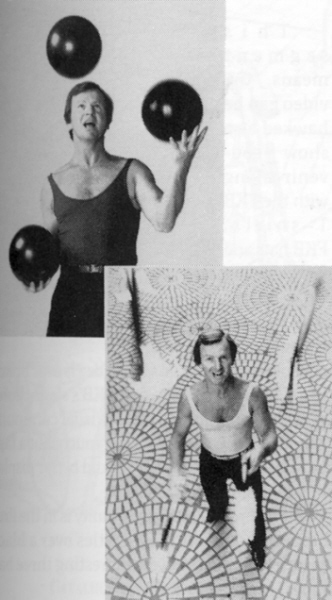
Ray Jason |
Page 11 Summer 1991
|
First Juggler On The Streets Marks 20 Year Anniversary
Ray
Jason, who began the modern tradition of street juggling by flinging
torches in front of San Francisco's Hyatt Regency Hotel in 1971, is
still at it.
This
summer he celebrates 20 years of a sometimes tough struggle to make
street performing legal and respectable. He returned from service
aboard an ammunition ship in the Vietnam theatre in 1971 and wanted
to "separate himself from the war machine." So, without
much of an idea of what he was doing, he put on some tights, a
frilly shirt and beret and took his torches down to a street fair.
His
act improved steadily, but he spent a lot of time playing tag with
the police and the legal system. Jason refused to budge, and always
found a way to return from the station house to the streets. The
city finally settled on ways to accommodate him and other jugglers
who demanded their freedom of expression.
He
knew early on that street juggling was not just a stepping stone,
but a career. The city was never for him a step to another place,
but a place in itself where he could become well known and
respectable. The sign on his prop table says, "Ray Jason - San
Francisco Street Performer - AND PROUD OF IT!"
With
a self confident nature and determination to become a San Francisco
folk hero, Jason has gained more acclaim in two decades than any
other street performer. He has been official juggler of the San
Francisco 49er football team for 10 seasons, he performed for the
Queen of England during her visit to that city, and the occasion of
his 10th anniversary was marked as "Ray Jason Day" in a
mayoral proclamation.
How
long does he intend to keep it up? He told a writer two years ago,
"I'm a 42-yearold guy who juggles bowling balls. I want to be
a 52-year-old guy who juggles bowling balls."
Will
Computer Animation Teach Juggling Patterns?
Using
computer graphics
as a juggling teaching tool is an idea that
intrigues many people. It has been "tossed around"
the electronic
JUGGLEN network for several months now, with discussions of
various approaches to the technological problems involved. The
networkers are hoping to use math to generate patterns no one has seen
before, and to program a computer to take the mathematical notation of
these new patterns and show what it would look like to do them.
People
are approaching this technologically demanding challenge on many
fronts. Christopher Watson, an engineer at Silicon Beach Software in
San Diego, explained one way to get a graphic juggling output in an
article in the Spring 1991 issue of MacTech Journal.
He
wrote a basic three-baIl cascade pattern to demonstrate the high-speed
animation capabilities of that company's product, Supercard 1.5. It
shows two hands and three balls floating on the screen, cascading in
an endless loop. It can be run at varying speeds from slow motion to
real-time. The article explains the concept of creating the animation
in Supercard, and also lists the complete line code for those who want
to try it themselves.
The
main idea is to precalculate the locations of the three bails and the
two hands at various intervals of time during each cycle, and then
update the locations at each time interval. At the end of the article,
Watson says that "without too much more work, it would be very
possible to create variations on the path the balls and hands take,
switching between them randomly by feeding new coordinate lists into
the "animate BaIls handler."
Watson
admitted in a telephone interview it would take some time and
expertise to revise the program for different patterns, but he does
believe it could be an effective teaching tool.
The Silicon Beach crew might be a logical group to take on the challenge. Watson says there's a set of beanbags on almost every desk, and folks can be found juggling individually or in groups frequently during the work day. Watson himself, though, didn't know how to juggle when he wrote the article! He said, though, that a friend is teaching him now! |

Ray Jason |